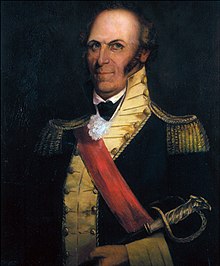Charles Scott (governor)
| Charles Scott | |
|---|---|
 |
|
| 4th Governor of Kentucky | |
|
In office September 1, 1808 – August 4, 1812 |
|
| Lieutenant | Gabriel Slaughter |
| Preceded by | Christopher Greenup |
| Succeeded by | Isaac Shelby |
| Personal details | |
| Born | April 1739 Cumberland County, Virginia |
| Died | October 22, 1813 (aged 74) Clark County, Kentucky |
| Resting place | Frankfort Cemetery |
| Political party | Democratic-Republican |
| Spouse(s) |
Frances Sweeney (m. 1762–1804) Judith Cary (Bell) Gist (m. 1807–13) |
| Relations | Father-in-law of George M. Bibb Step-father-in-law of Jesse Bledsoe, Nathaniel G. S. Hart and Francis Preston Blair |
| Residence | Petersburg, Canewood |
| Occupation | Farmer, Miller |
| Profession | Soldier, Politician |
| Signature | |
| Military service | |
| Allegiance | Colony of Virginia, Thirteen Colonies, United States |
| Service/branch | Virginia militia Continental Army Kentucky militia |
| Years of service | 1755–c.1761 1775–1783 1790–1794 |
| Rank | Major general |
| Unit |
Virginia Regiment 2nd Virginia Regiment |
| Commands |
5th Virginia Regiment 4th Virginia Brigade 2nd Division, Kentucky militia |
| Battles/wars | French and Indian War, Revolutionary War, Northwest Indian War |
Charles Scott (April 1739 – October 22, 1813) was an 18th-century American soldier who was elected the fourth governor of Kentucky in 1808. Orphaned at an early age, Scott enlisted in the Virginia Regiment in October 1755 and served as a scout and escort during the French and Indian War. He quickly rose through the ranks to become a captain. After the war, he married and engaged in agricultural pursuits on land left to him by his father, but he returned to active military service in 1775 as the American Revolution began to grow in intensity. In August 1776, he was promoted to colonel and given command of the 5th Virginia Regiment. The 5th Virginia joined George Washington in New Jersey later that year, serving with him for the duration of the Philadelphia campaign. Scott commanded Washington's light infantry, and by late 1778 was also serving as his chief of intelligence. Furloughed at the end of the Philadelphia campaign, Scott returned to active service in March 1779 and was ordered to South Carolina to assist General Benjamin Lincoln in the southern theater. He arrived in Charleston, South Carolina, just as Henry Clinton had begun his siege of the city. Scott was taken as a prisoner of war when Charleston surrendered. Paroled in March 1781 and exchanged for Lord Rawdon in July 1782, Scott managed to complete a few recruiting assignments before the war ended.
...
Wikipedia
